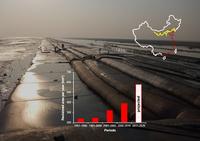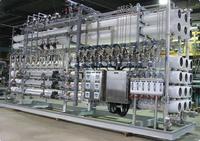-
Egypt thwarts terrorist attack on Israeli gas platforms in the Mediterranean Sea

Egypt said it had thwarted an attempt by Islamic State (ISIS)-affiliated Egyptian terrorists on 12 November to attack Israeli energy platforms in the Mediterranean Sea. The terrorists, members of the Ansar Bayt al-Maqdis terror group which operates in the Sinai Peninsula, commandeered an Egyptian navy missile boat for the planned attack. Other Egyptian navy vessels gave chase and stopped the commandeered missile boat, killing eight aboard in a heavy exchange of fire. In addition to attacking Israeli gas platform, the terrorists planned to attack Israeli ships.
-
-
Impasse in Congress over terrorism insurance (TRIA) renewal

The Terrorism Risk Insurance Act(TRIA) is expected to expire by 31 December unless Congress renews the legislation or places a temporary extension. The legislation, initially established in November 2002 as a federal backstop to protect insurers in the event an act of terrorism results in losses above $100 million, has been extended and reauthorized. The insurance industry supports the reauthorization approved by the Senate, and opposes a short-term extension. Some insurance companies have noted on their contracts that policyholders could lose terrorism coverage if TRIA is not renewed.
-
-
Here’s how to fix America’s crumbling bridges

There are about 600,000 bridges in the United States, and about one in four is classified as functionally obsolete or structurally deficient. This doesn’t mean they’re in danger of imminent collapse; they may be simply too narrow or built for lighter traffic than today’s standards. Bridges that can’t support heavy trucks have weight restrictions posted. There are plenty of repairs that need to be done. With government funding for infrastructure projects being so tight, an alternative has arisen in what are called public-private partnerships, often abbreviated PPP or P3. In this arrangement, private investors assume the responsibility for financing and building a bridge or highway, and the investors are granted the right to collect tolls for what may be decades. The investors naturally believe they will realize a good return on their investment, even after they pay the public partner a sizable sum upfront for the concession. This upfront payment can be in the billions of dollars, which can be very tempting for a state or municipality struggling to balance its budget.
-
-
Internet security market to reach $42.8 billion globally by 2020
According to a new report by Allied Market Research, the global Internet security market is expected to reach $42.8 billion by 2020, registering a CAGR of 8.1 percent during 2014-2020. The market, driven by demand for software solutions, would experience a shift toward the adoption of cloud-based systems. About 80 percent of the top companies today identify with cloud-based security services which have become a prominent market trend.
-
-
A malware more sophisticated than Stuxnet discovered
Security experts at Symantechave discovered the world’s most sophisticated computer malware, Regin. Thought to have been created by a Western intelligence agency, and in many respects more advanced than Stuxnet — which was developed by the U.S. and Israeli government in 2010 to hack the Iranian nuclear program — Regin has targeted Russian, Saudi Arabian, Mexican, Irish, and Iranian Internet service providers and telecoms companies. “Nothing else comes close to this … nothing else we look at compares,” said one security expert.
-
-
Security concerns over purchase of Waldorf Astoria by Chinese company

Citing espionage risk, U.S. officials are expressing concern over the sale of the historic Waldorf Astoria hotel in New York City to a Chinese insurance company. The sale of the hotel will likely lead to a review by the U.S. Committee on Foreign Investment (CFIUS) of the Chinese firm’s long-term plans for the site and the finer details of the sale. “Because the agreement calls for major renovations to the hotel, CFIUS will be worried that the Chinese could engage in some form of espionage,” said a former Treasury Department official who managed CFIUS reviews.
-
-
China’s second “great wall” is not so great

China’s coastal regions are only 13 percent of the country’s land area, but contribute 60 percent of its gross domestic product. With that come layers of incentives to turn lush wetlands into engines of development and industry. A new study finds that China’s second great wall, a vast seawall covering more than half of the country’s mainland coastline, is a foundation for financial gain - and also a dyke holding a swelling rush of ecological woes.
-
-
New, updated resource on STEM education, workforce
It just became a lot easier for educators, students, parents, policymakers and business leaders to learn more about national trends in education and jobs in science, technology, engineering, and mathematics (STEM). The National Science Board (NSB) last month released an interactive, online resource featuring new and updated data and graphics about STEM education and workforce in the United States and providing facts on topics such as student proficiency, college degrees in STEM fields, and jobs in science-related occupations.
-
-
Selling and buying water rights
Trying to sell or buy water rights can be a complicated exercise. First, it takes time and effort for buyers and sellers to find each other, a process that often relies on word-of-mouth, local bulletin boards, even calling friends and neighbors to get the word out. Then they must deal with the maze of rules and regulations involved. Finally, they must reach a fair price. It would be much easier if a computer could do it. Now, one can. Scientists have developed an algorithm that can match potential buyers and sellers, sift through the complexity of local physical and regulatory systems, and reach a fair deal designed especially for them.
-
-
Climate-related businesses growing
The business of climate change has seen significant growth in the last decade, but analysts believe it will take many more years to determine the effectiveness of the solutions proposed by climate-focused businesses. U.S. farmers working more than fifty million acres had subscribed to its Climate Basic Service— a free Web and mobile service that analyzes data to help farmers make planting decisions with “field-level insights, from soil moisture levels, to crop growth stage, to current and future weather.” The group’s free app and Web service may be augmented through its Climate Proand Precision Acrepaid plans.
-
-
Water sector ready for investment, technological innovation

Investors looking for promising growth markets would do well to consider their water bill. Water’s artificially low price in most of the United States is one factor holding back innovative new water technologies, according to the report – but the time is right for change. Across the West, drought has left wide swaths of agricultural land brown, with massive wildfires raging through tinder-dry forests, residential wells tapped out and unemployed farm workers crowding food pantries. The drought is projected to cost the agricultural sector about $2.2 billion in 2014. The social and ecological damage is also profound. Technological innovation in the water sector could bring a raft of benefits ranging from the conservation of scarce water supplies to the expansion of water supplies through technologies that recycle or desalinate, for example.
-
-
More companies adopt active defense to thwart hackers
Some U.S. companies are beginningto counter-hack cybercriminals by using intelligence shared within industry circles. Federal officials have not openly endorsed active defense, but measures like tricking hackers into stealing fake sensitive data, then tracking its movements through the Web, are gaining support. Some firms have gone as far as hacking alleged criminals’ servers. “The government is giving ground silently and bit by bit on this [active defense] by being more open,” said former National Security Agencygeneral counsel Stewart Baker. “I have a strong sense from everything I’ve heard. . . that they’re much more willing to help companies that want to do this.”
-
-
Vets, victims’ family members suing European banks for supporting terrorism
About 200 U.S. veterans and family members of soldiers killed in Iraq filed a lawsuit on Monday in the U.S. District Court in Brooklyn, New York, claiming five European banks were partly responsible for a series of shootings and roadside bombings in Iraq. The lawsuit brought under the 1992 U.S. Anti-Terrorism Act, which permits victims to bring private suits against alleged financiers of militant and terrorist operations.
-
-
Information sharing is key in responding to cyberattacks
Time is not your friend when your information systems are under cyberattack, but sharing threat information before, during, and after an attack with a trusted group of peers can help. Not only does it alert the other members of your community to a potential attack, it can provide critical actionable information to speed and bolster your own defenses. Participating in a formal information sharing group can greatly enhance an organization’s cybersecurity capabilities.
-
-
Protecting the U.S. food supply from agroterrorism

“For the life of me, I cannot understand why the terrorists have not attacked our food supply because it is so easy to do,” said Tommy Thompson during his 2004 farewell speech when he left his post as U.S. secretary of Health and Human Services. Documents found in a 2002 U.S. military raid on an al-Qaeda warehouse showed that terrorists sought to contaminate the U.S. food supplies. The documents included detailed instructions for attacking U.S. agricultural assets. Researchers at the University of California-Davis’ Western Institute for Food Safety and Security(WIFSS) are studying vulnerabilities of the U.S. agricultural system to the threats of agroterrorism.
-
More headlines
The long view
Need for National Information Clearinghouse for Cybercrime Data, Categorization of Cybercrimes: Report
There is an acute need for the U.S. to address its lack of overall governance and coordination of cybercrime statistics. A new report recommends that relevant federal agencies create or designate a national information clearinghouse to draw information from multiple sources of cybercrime data and establish connections to assist in criminal investigations.
Trying to “Bring Back” Manufacturing Jobs Is a Fool’s Errand
Advocates of recent populist policies like to focus on the supposed demise of manufacturing that occurred after the 1970s, but that focus is misleading. The populists’ bleak economic narrative ignores the truth that the service sector has always been a major driver of America’s success, for decades, even more so than manufacturing. Trying to “bring back” manufacturing jobs, through harmful tariffs or other industrial policies, is destined to end badly for Americans. It makes about as much sense as trying to “bring back” all those farm jobs we had before the 1870s.
The Potential Impact of Seabed Mining on Critical Mineral Supply Chains and Global Geopolitics
The potential emergence of a seabed mining industry has important ramifications for the diversification of critical mineral supply chains, revenues for developing nations with substantial terrestrial mining sectors, and global geopolitics.
Are We Ready for a ‘DeepSeek for Bioweapons’?
Anthropic’s Claude 4 is a warning sign: AI that can help build bioweapons is coming, and could be widely available soon. Steven Adler writes that we need to be prepared for the consequences: “like a freely downloadable ‘DeepSeek for bioweapons,’ available across the internet, loadable to the computer of any amateur scientist who wishes to cause mass harm. With Anthropic’s Claude Opus 4 having finally triggered this level of safety risk, the clock is now ticking.”
